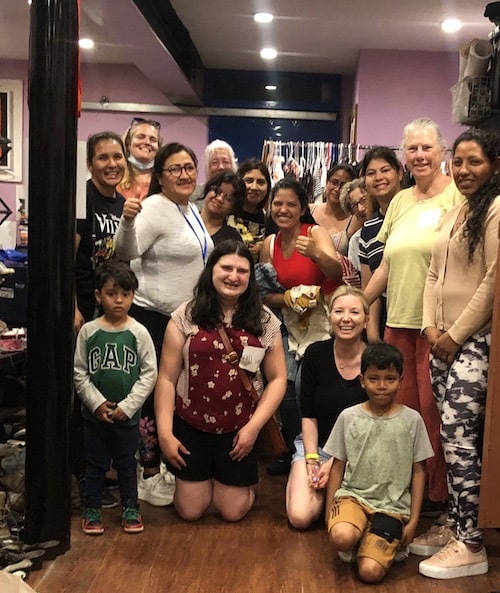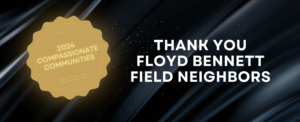Compassionate Communities Award 2024
Floyd Bennett Field Neighbors: 2024 Compassionate Communities Award Recipient
In mid-2022, New York City began seeing a rapid increase in the number of asylum seekers and other new arrivals coming here to seek refuge. Most came fleeing violence, persecution, and economic instability. Tonight, because of every level of government’s failure to provide the tools these families and individuals need to find jobs, housing, and stability in the community, more than 53,000 new arrivals are still sleeping in shelter facilities.
Most of these new arrivals have come with their entire households to support. In fact, members of families with children make up 77 percent of all new arrivals in NYC shelters. But given the lack of a formal income without federal work authorization, a stretched shelter system, and limited resources, thousands of these families rely on the kindness of New Yorkers to address many of their basic needs. Notable for their deep compassion and activism on behalf of the new arrivals are the volunteers of Floyd Bennett Field Neighbors.
The Coalition for the Homeless has the privilege of honoring Floyd Bennett Field Neighbors (FBFN or the Neighbors) as this year’s Compassionate Communities Award recipient. Despite many of the new arrivals they serve residing in an isolated location where community can feel so distant, the volunteers of FBFN are demonstrating the true power of empathy and action.

Floyd Bennett Field Neighbors is a mutual aid volunteer collective whose mission is to support the families and their children living in Floyd Bennett Field – the decommissioned airfield on the remote southern edge of Brooklyn – by helping them cover their basic needs, navigate the City’s systems, improve their quality of life, and by providing a humanizing and welcoming experience as they go through one of the most difficult and uncertain periods of their lives. While the collective’s primary advocacy goal has been the closure of the Floyd Bennett Field shelter because it is an entirely inappropriate site for families with children, the group’s name reflects this primary mission of being a group coming together as neighbors to welcome – and becoming neighbors to – the new arrivals to their community.
Floyd Bennett Field itself is the site of one of the City’s Humanitarian Emergency Response and Relief Centers (HERCCs) for families. The site has a series of massive tents with cots that constitute “semi-congregate” living facilities, where families have little privacy or security. Floyd Bennett Field is located three miles from the nearest commercial or residential area, and a half mile trek from the nearest bus line, making it extremely challenging to commute to work opportunities in the city or access critical resources. The site’s seaside location also creates a dangerous climate, especially for residents lacking sufficient or appropriate clothing. The field is prone to flooding, and residents sometimes need to trudge through ankle-deep water to get to their temporary homes. Additionally, the drafty, soft-sided tents are no match for the chill of winds coming directly off of the ocean. In fact, such conditions were so extreme in January that families had to be temporarily evacuated from the site.
The first FBFN volunteers – community members living in the surrounding areas who understand the harsh nature of the site – were alarmed to encounter new arrival families, and especially children, underdressed in tank tops and flip flops in the dead of winter on the Q35 bus. Independently, these community members started to visit the site to offer aid, weather-appropriate clothing, and children’s toys. When these individuals began to run into one another at the site and coordinate their efforts, the Floyd Bennett Field Neighbors collective started to take shape.
The united collective organized a total of four mass distribution clothing drives for those sheltered at Floyd Bennett Field over the winter of 2023-2024. However, shortly thereafter, FBFN was prevented from directly supporting new arrivals at the shelter site. Undeterred, the collective established a store off of the Q35 bus line in April 2024 to continue providing needed clothing for free, while allowing shelter residents the dignity of an independent shopping experience. FBFN’s volunteers bring a quiet, caring energy to the store that creates a welcoming and supportive atmosphere. This store still operates each Saturday.
FBFN has also continued to listen to shelter residents and adapt its work to provide needed supplies and to advocate on their behalf with various government officials. For instance, when it became clear from conversations with shelter residents that strollers were needed for parents to transport multiple young children between the field and the distant bus stop, the Neighbors took it upon themselves to collect them. Additionally, immediately after the Adams’ Administration announced it would implement a new policy requiring new arrival families with children staying in HERRCs to vacate their existing placements and reapply for shelter every 60 days, FBFN again swiftly stepped into action to provide as many shelter residents as possible with the suitcases they would need to take all of their possessions with them when they were ejected from the shelter. FBFN also testified at New York City Council hearings about the harm this 60-day policy would cause for the families at Floyd Bennett Field.
In addition to FBFN’s efforts to distribute essential provisions for shelter residents, volunteer Ariana Hellerman shares that they “always set aside some money for joy” – something the shelter system is definitely not designed to provide. These “moments of joy” have included face painting for kids on Halloween, a Three Kings Day celebration with a band, and the creation of a “New York City Joy Guide” listing free events happening around the city. On several occasions, FBFN has organized buses to bring residents directly from the shelter to these free events, including the performance of a Guatemalan artist whose songs of migration elicited tears from attendees.

In the process of carrying out all of these efforts for field residents, FBFN established and fostered what is now the largest and most-used communication channel among residents in the facility. The language barrier to communicating with residents for whom informational materials are not always available – had created a gross lack of critical information and a spread of misinformation within the shelter. FBFN’s communications channel – including both shelter residents and FBFN volunteers – began as a way for volunteers to answer residents’ questions and make sure each family was receiving accurate information relevant to their placement in the shelter and their legal obligations as new arrivals in the country. Today, shelter residents have embraced the platform and the community it represents to such an extent that they are largely able to help answer questions and provide mutual support for one another. The channel has also helped FBFN’s advocacy efforts remain grounded in shelter residents’ actual expressed needs.
Earlier this month, the Adams Administration announced that the shelter facility at Floyd Bennett Field will be shutting down. The facility’s closure is welcomed by FBFN, who was concerned that it could easily be converted into a detention center in the aftermath of the 2024 presidential election. The announcement of the site’s closure and the recent tense political climate have spurred a second wave of volunteers – now totaling roughly 300 individuals – rushing to help Floyd Bennett Field residents safely transition to their new shelter assignments. FBFN has renewed its suitcase campaign, and is currently advising the Mayor’s Office and NYC Health + Hospitals on how to adequately factor in the shelter residents’ needs in this transition. FBFN’s current advocacy priorities are to ensure families are reassigned to shelters near their children’s schools, and to have the reassignment process take place at Floyd Bennett Field rather than requiring all residents to pack up their entire lives, walk them to the Q35 bus, and wait indefinitely for reassignment at the Welcome Center in midtown Manhattan.
While it is not clear what form Floyd Bennett Field Neighbors’ work will take after all residents are reassigned to different shelters and the massive tents are taken down, the organization can benefit from assistance this winter supporting the facility’s residents in their transition. The collective accepts donations, has wish lists of items shelter residents need – including moving supplies as part of its second suitcase campaign – and encourages anyone to sign up for a volunteer shift. Those speaking Spanish, Haitian Creole, and Mandarin are particularly encouraged to volunteer, but FBFN values all volunteers for their skills, connections, time, and willingness to show up and help. Those interested in volunteering or making donations can go to FBFN’s website (https://www.fbfneighbors.org/) for more details. FBFN also recommends following its Instagram to stay up to date with ways to help and information about the evolving situation for the current Floyd Bennett Field shelter residents.
Floyd Bennett Field Neighbors exemplifies the spirit of the Compassionate Communities Award. As their efforts continue to adapt to meet emerging needs, FBFN remains a consistent symbol of resilience and partnership for those they serve. Their dedication to walking in step with their new neighbors and improving the lives of vulnerable families through direct action and systemic advocacy should inspire all of us to action on behalf of those in our communities who are most in need.
Past Recipients
2023: Afrikana & Adama Bah
2022: Midtown Open Hearts
2021: North Brooklyn Mutual Aid’s NBK Essentials Initiative
2020: Upper West Side Open Hearts Initiative
2019: Clinton/Hell’s Kitchen and Chelsea, Manhattan
2018: Northwest Bronx
2017: Elmhurst, Queens
2016: Kensington/Windsor Terrace, Brooklyn
Be a Compassionate Community
Here are some first steps you can take to transform your neighborhood into a welcoming, compassionate place for all New Yorkers:
- Find answers to frequently asked questions on how to help homeless individuals and families that you encounter in your community.
- Join our online community and receive monthly news on homelessness in NYC, updates on the Coalition’s advocacy efforts, and ways you can get involved and take action.
- Follow us on Twitter, Facebook, and Instagram to see our work in action every day and learn how to help.
- Support our 11 frontline programs that help 3,500 homeless New Yorkers each day with emergency services, food, job training, housing, and more.
- Click here to learn about volunteer opportunities, events, drives and sponsorships, easy advocacy actions, and other ways to take action.
